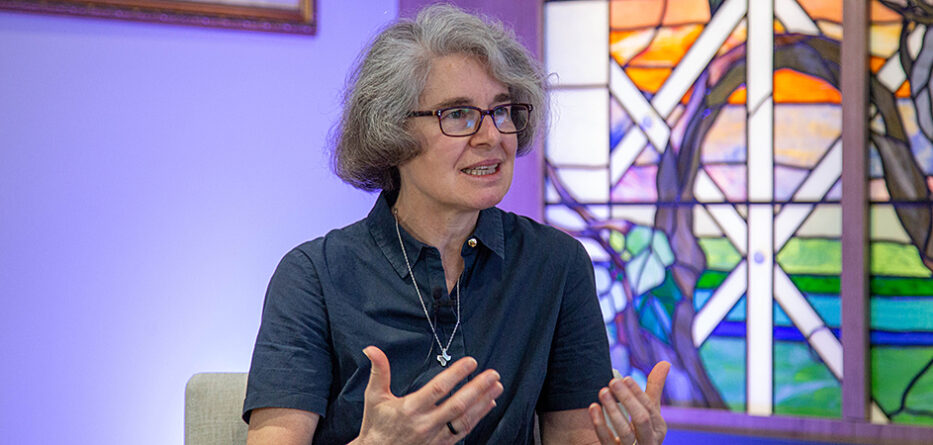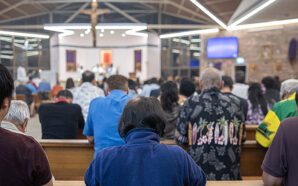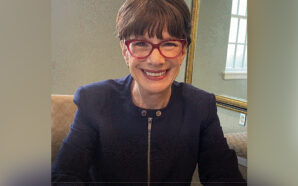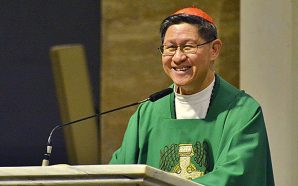Sr Nathalie Becquart XMCJ, described as the most senior woman in the Vatican, recently made a whirlwind tour of Australia. She gave talks and interviews with many people, and truly represented the synodal Church preparing for the Synod of Bishops gathering in 2023/2024. I was extremely privileged to be given some time with her to ask some questions that are pertinent to this blog, and have been asked by our readers.
Elizabeth: Through this synodal process, how do you see the promotion and expansion of the permanent diaconate?
Sr Nathalie: We are in a process, a phase of listening to people. It is true that sometimes we talk about lay, priests and religious, but we forget the permanent deacons. They are very different in different countries. The possibility of permanent deacons was reinstated by Vatican II, then it has been up to Bishops’ conferences and dioceses. Some conferences have promoted them like in Australia and France, but it is not per see.
The challenge is what kind of ministerial organisation will serve the world and Church of today. More and more, we understand with the reception of Vatican II that we need to minister to the Church in many ways. The permanent deacon is one. In some places it has been recognised and promoted as a way to serve, but not so much in other countries. In some places there are more catechists. Pope Francis has instituted the ministries of lector, acolyte and catechist.
We can’t think of one ministry in itself, but we are thinking of the broad view. We can see in many countries that women are serving the diaconate of the Church; this was especially raised in the Synod of the Amazon. We need to be creative. Historians know that there have been women deacons in history. Some Orthodox churches have reinstated them, such as the Armenian Apostolic Church. We need to take things into account and discern.
What I see is that there is not yet a complete and precise theology of the diaconate. According to where they are, permanent deacons are doing different things. They are supposed to be for those on the margins, but sometimes they are only doing parish work. This Synod is discerning how to be Church for today and tomorrow, including all kinds of ministries.
Elizabeth: How is the global church prioritising the liturgical ministry needs of those on the margins?
Sr Nathalie: It is difficult to say. It is true that the synodal process is not to promote one idea over another. It is about the ideas of everybody. If we have an agenda or priority before, it is not synodal. We can’t know beforehand what the priorities will be. What has been, and is still, true is that there is a great emphasis on our need to listen to those on the margins – that has always been the ministry of the Church.
The Eucharist is the summit and source of Christian life. Liturgy is one of the topics that came through strongly in the Synod’s working document. The question is how to have synodal liturgies. A priority of Sacrosantum Concilium was active participation of the people in the liturgy. It is up to each continent, but we will see what will happen in Rome.
The intention to be with the people on the margins is there, including in liturgy, as one dimension. It is also in the dimension of diakonia. A question in many regions is how you can live liturgy with people.
We should promote the listening to the word of God – which is the centre of a synodal church. What we see is the bigger emphasis on the word of God, and listening to the Liturgy of the Word. Those who are more involved in synodality are the countries with a long experience of small Christian communities, such as BECs. It is a path to be with people on the margins. That is the first place where you experience the community in small groups.
I think also from my experience in youth ministry, we can have too much focus on the Eucharist. Not that it isn’t important; indeed all our life is called to become the Eucharist. But in France, for example, many parishes are praying the Liturgy of the Hours. COVID has seen people developing domestic liturgies in families. The code is to be inclusive. The synodal way is to celebrate liturgy with this vision of welcoming and inclusivity.
Elizabeth: How can a more diverse church leadership connect better with a diverse Catholic population?
Sr Nathalie: One of the main challenges for the church today is interculturality. More and more, we have migration of peoples from all over the world. Our communities in many countries are more diverse, and the first diversity is cultural. Interculturality is a very important topic of synodality. In the synodal process, the call is to continue the path of inculturation in the liturgy. It is not new, but it is also not finished.
In many dioceses and parishes, there is not one culture, but many different backgrounds. We need to do that interculturality process. One of the issues for religious life, parishes and dioceses is that we have more and more priests from Africa and Asia. What I think is that there is a need to train every pastoral agent – those in leadership in many ways – in intercultural dialogue and encounter. It is not easy, but it is a creative path; it is the path of synodality.
Where Sisters are coming from different cultures, it is not about the dominant culture imposing, but about valuing different cultural backgrounds, and coming together to create a new culture. It is the same spirit, the spirit of synodality and interculturality. And the process is the same: listening, discerning together, opening a creative way to live and celebrate together. Sometimes it can be done in beautiful ways. I was very struck by my experience at World Youth Day 2008 in Sydney. There was a strong element of the tradition, but in the way it integrated cultures that were indigenous and from the Islands, it was beautiful. We should not only do that during World Youth Day, but in everyday liturgical life.
Elizabeth: Are there mechanisms for canon law to change as outcomes of the Synod?
Sr Nathalie: We don’t know the outcome of the Synod. But we know from the theological reflection that we need to look at canon law and maybe we need to change. On the synodal theological commission we have canon lawyers. We already have many possibilities and synodal institutions – such as parish councils – but they are not mandatory. There is an openness to change, for example the Pope has recently made several changes. It is not written in stone for eternity.
One part of the working document says that we may need new structures, but it has to be discerned. Within canon law today, there are many things we can do – such as in ministry and liturgy. Maybe we need others, but in the present situation we can concretely embody synodality. And we know that there are many ways to celebrate liturgy.
Thank you so much for your time, Sr Nathalie!
Reproduced with permission from Elizabeth Young rsm and Liturgy on the Margins.








